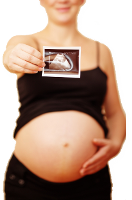Author: Angela Lemond, RD, CSP, LD
www.mommydietitian.com
As moms, we all know how exciting of a time it is to be pregnant. This time can bring on some
challenges related to the surge of hormonal changes going on throughout the gestation period. Some
fair these changes with little difficulty while others have problems. With my second child, I struggled
much more than my first with both food aversions and nausea. I had cravings for processed foods,
especially processed meats - hot dogs, deli meat, and fried chicken - which are fairly unusual for me.
We went to the Texas State Fair the year I was pregnant and I had an extreme craving for their world
famous corny dogs. I told my husband about my primal anticipation and he looked at me very strangely
and said, "Who are you and what did you do with my wife?" But the funniest part of the story was that
when I finally got a hold of the corny dog, I began scarfing it down like I hadn't eaten in a month. I was
half way finished with it when my love for the dog turned to hate. How could a food taste so incredible
one minute and then taste like rot the next? Yuck! I had to get it away as fast as possible. The smell,
the flavor - everything about it was hideous. So I know firsthand that yes, hormones are a crazy thing
in pregnancy!
It is very common to have food aversions and nausea in pregnancy, particularly in the first trimester.
But in the most extreme cases, hormonal illness in pregnancy can cause continuous vomiting and the
inability to keep food down. It can get so bad that intravenous feeding is necessary. Of course that is an
extreme and rare situation, but it can happen. Here is a quick reference chart that can help you deal
with your nausea in pregnancy.
| CONSUME |
AVOID |
|
Bland foods. [During extreme nausea and recovering from vomiting]
These include white breads and pastas, applesauce, bananas, eggs and lean meats with minimal seasonings.
They are easy to digest, soothe your stomach while providing much needed calories and nutrition.
|
Strong smells. As you are probably aware, your senses are heightened during pregnancy and that includes your sense of smell.
|
|
Focus on nourishing foods. [Light to no nausea] Foods that nourish the body the best are the ones
that contain the most nutrients. Lean meats, fish, beans, low-fat dairy, fruits, vegetables and healthy
fats all supply the vitamins and minerals moms and babies need.
|
Skipping meals. Just as a stomach that is too full can cause nausea, the same is true with an empty
stomach. The best way to eat during pregnancy is small, frequent meals.
|
|
Peppermint or ginger. Both are safe in pregnancy and have been shown to decrease and treat
pregnancy nausea. Make sure that you get real peppermint and real ginger foods and drinks.
Things like commercial ginger ale do not contain the real thing.
|
Foods that cause reflux. Acidic foods, high fat foods, chocolate and large meals tend to produce
more stomach acid. This can exacerbate nausea and also contribute to reflux (reflux also increases
as the belly gets bigger due to anatomical pressure).
|
|
Salty crackers. You read it everywhere and it's true. They really help. And normally I would say
go for the whole grain ones, but in the case of pregnancy nausea, it's probably best to go for the
old saltine-type crackers that get into your system faster.
|
Drinks with meals. If you really need something to wash your food down, sip on water that is room
temperature. Drinking warm, cold or too much fluid can expand your stomach to the point of
causing nausea and exacerbating reflux.
|
|
Food with medication and vitamins. Both increase stomach acid in general, so make sure
you take them with food unless instructed otherwise. Do not take any medication, vitamins
or herbal supplements without telling your doctor first.
|
Strong smells. As you are probably aware, your senses are heightened during pregnancy and that
includes your sense of smell.
|
|
Enjoy decadent food cravings in moderation. We still need to exhibit self-control in pregnancy
because the reality is that we are not eating for an equivalent of 2 people. More than ever, women
are exceeding the weight gain goals for pregnancy and that its implications on both mom and baby.
But allowing yourself to eat some of your decadent food cravings will make you feel more satisfied
during pregnancy. Most decadent foods may fall into the "avoid" category, so consume only if they
do not contribute to feeling ill.
|
All personal food aversions. Each of our pregnancy experiences vary and that is also the
case when it comes to the foods that we crave and dislike. Listen to those cues of aversions to avoid
an unnecessary illness. If that aversion is high in nutritive value, try a similar alternative, or seek
advice from a Registered Dietitian.
|
If you cannot keep food and/or liquid down without vomiting, contact your doctor. He may prescribe
some medication that will assist you during this period. Know the signs and symptoms of dehydration
which include dizziness, weakness, decreased urination, dry eyes, headache and dry mouth or eyes.
Discuss your weight gain with your doctor. If either you or your doctor do not think you are gaining
weight or are not getting the food variety suggested in pregnancy (see Pregnancy Nutrition: The Basics),
seek assistance from a Registered Dietitian in your area. They can work with you on an individual basis
to maximize your nutrition status - for you and your baby's sake. One day, like me, you can share giggles
with others about your food issues during pregnancy. Know that this is a phase - and this phase will
certainly pass!


 Community
Community




